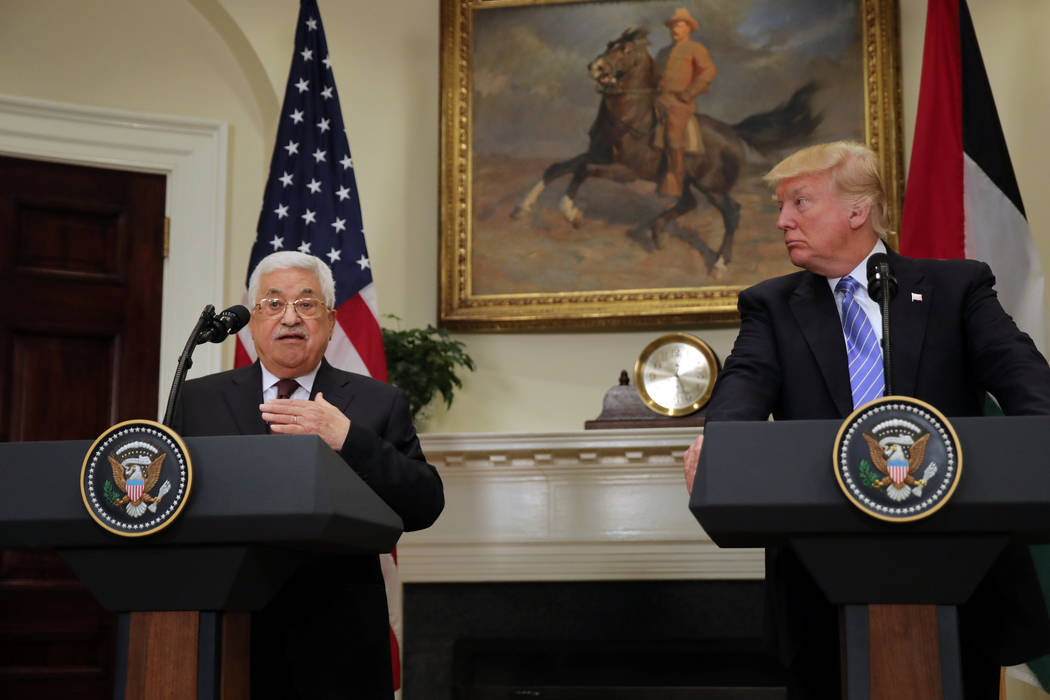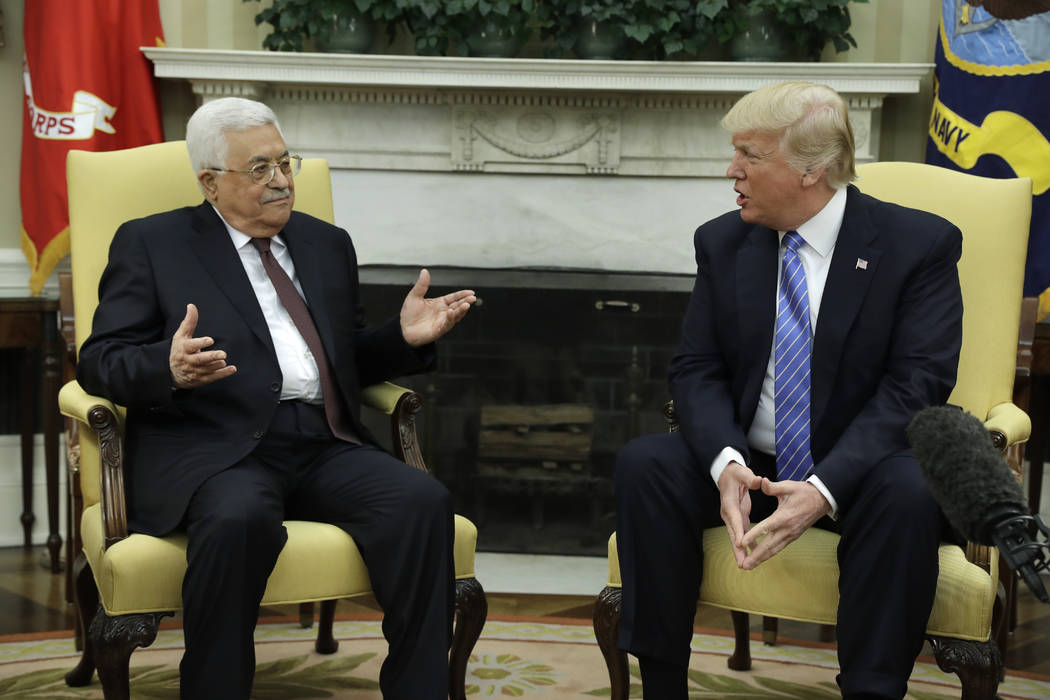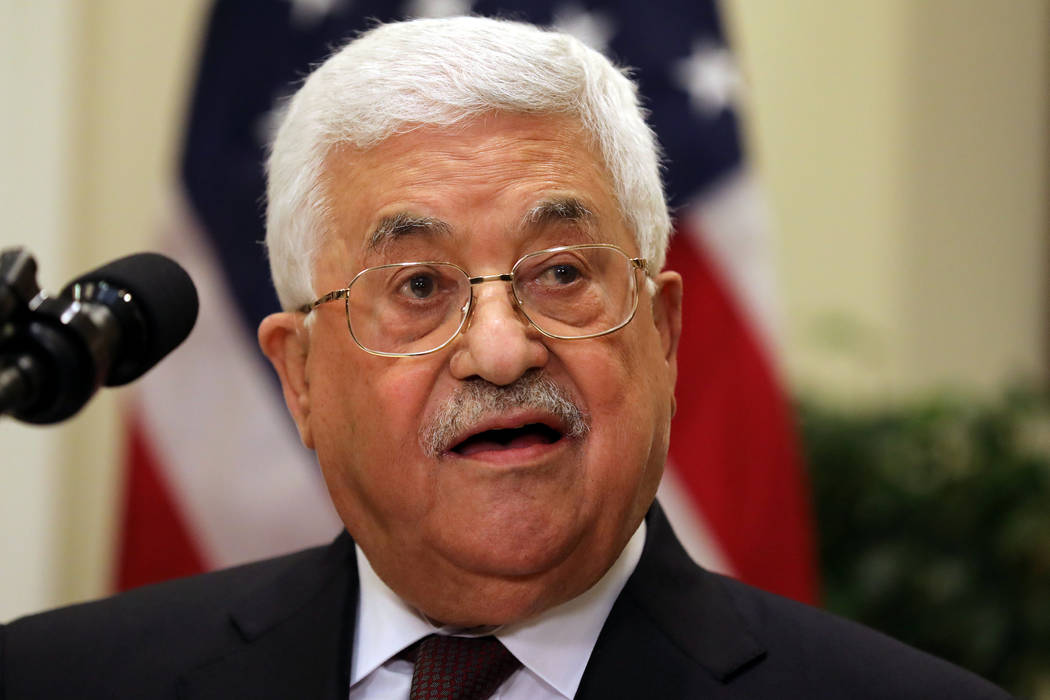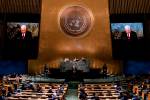Trump meets with Palestinian leader Abbas at White House
A day after Vice President Mike Pence said the U.S. is seriously considering moving its embassy in Israel to Jerusalem, President Donald Trump met with Palestinian leader Mahmoud Abbas at the White House.
“I’ve always heard that perhaps the toughest deal to make is the deal between the Israelis and the Palestinians,” Trump declared Wednesday as the leaders made a joint statement in the Roosevelt Room. Reiterating his goal in brokering a long-term compact, he added, “Let’s see if we can prove them wrong.”
Abbas told Trump he thought a permanent solution was possible “under your great negotiating ability.”
As a candidate, Trump promised to move the American embassy from Tel Aviv to Jerusalem – the city that both Israel and the Palestinians claim as their capital. But past presidents Bill Clinton and George W. Bush made the same campaign pledge, only to change their minds after they won election.
Trump did not answer shouted questions about the U.S. Embassy in Israel or whether he plans to visit Ramallah, a Palestinian city on the West Bank, during a planned trip to Israel later this month. Press Secretary Sean Spicer would not say if Trump and Abbas discussed the embassy controversy.
Abbas came to the White House as GOP senators have been pressing the Trump administration to push for an end to Palestinian Authority payments to the families of suicide bombers and to Palestinians serving time in Israeli prisons for attacking Israelis and tourists.
Trump did not directly address the issue in his comments, but warned, “There cannot be lasting peace unless the Palestinian leaders speak in a unified voice against incitement to … violence and hate.”
In his public statement, Abbas said he thought the prisoner issue could be resolved.
Trump began his remarks with a nod to Abbas’ role in signing the first Israeli-Palestinian peace agreement with then-Israeli Prime Minister Yitzhak Rabin 24 years ago. Then he added, “I want to support you in being the Palestinian leader who signs his name to the final and most important peace agreement.”
Abbas, 82, however, showed how far apart Israelis and Palestinians are when he spoke in favor of “a Palestinian state with its capital of East Jerusalem that lives in peace and stability with the state of Israel based on the borders of 1967.”
Israel annexed East Jerusalem during the 1967 war and Israel has continued to authorize Jewish settlements in the territory since then.
During Israeli Prime Minister Benjamin Netanyahu’s visit with Trump in February, Trump told Netanyahu, “I’d like to see you hold back on settlements a little bit.”
Trump also famously said,
“So I’m looking at two states and one state. And I like the one that both parties like. I’m very happy with the one that both parties like. I can live with either one … To be honest, if Bibi (Netanyahu) and the Palestinians, if Israel and the Palestinians, are happy, I’m happy with the one they like the best.”
With his approach of doing whatever works, Trump seems to have moved away from his administration’s early flirtation with the “outside-in approach” – that is, leveraging other Middle Eastern leaders to pressure Palestinians to negotiate with Israel.
“This is a president that resonates with strong leaders,” hence his successful meetings with Jordan’s King Abdullah and Egyptian President Abdel-Fattah el-Sissi, said Grant Rumley of the nonpartisan Foundation for the Defense of Democracies. Trump also helped the process by dispatching special envoy Jason Greenblatt, whose visit to Ramallah left Palestinians “very impressed” and “cautiously optimistic,” he said.
Trump and Abbas voiced agreement on the need to defeat ISIS, which Abbas labeled a “criminal” group. Trump also dangled a carrot – an initiative to “help unlock the potential of the Palestinian people through new economic opportunities.”
The peace process has been stalled since 2014 when former U.S. Secretary of State John Kerry’s effort to lead the sides into peace talks collapsed. Since then, there have been no serious attempts to get negotiations restarted. The Obama administration spent its last months in office attempting to preserve conditions for an eventual resumption of negotiations.
Can Trump and his novice crew – Greenblatt, an attorney by trade, and son-in-law Jared Kushner – succeed where seasoned foreign policy professionals have not?
“We hope this will be a new beginning,” Abbas told Palestinians at a meeting in Washington on the eve of the talks.
The Associated Press contributed to this report. Contact Debra J. Saunders at dsaunders@reviewjournal.com or at 202-662-7391. Follow @DebraJSaunders on Twitter.






























